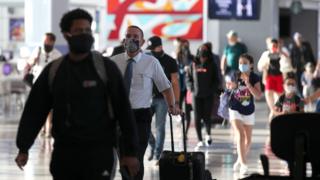
Image copyright
Getty Images
Data on how the coronavirus can spread between aircraft passengers is in short supply
Air passengers should have restricted access to toilets on flights as part of wide-ranging coronavirus safety recommendations, a UN agency has said.
The International Civil Aviation Organization (ICAO) guidelines also include limiting or suspending food and drink services on short-haul flights.
The new guidelines are designed to protect air passengers and workers from the Covid-19 virus as lockdown eases.
Airlines could see revenues plunge £314bn in 2020, the ICAO added.
The aviation industry has been struggling as lockdown measures around the world have limited flights and passenger numbers.
As those travel restrictions begin to ease, the ICAO has issued guidelines for governments, with the aim of airlines and airports having a unified response when trying to keep passengers and staff safe from coronavirus.
The ICAO stopped short of saying that passengers must be socially-distanced on planes, but it did say they should be seated separately “when occupancy allows it”.
Passengers should travel as lightly as possible, with small hand luggage stowed under their seat. Newspapers and magazines should be removed, and duty free sales should be temporarily limited, the UN’s civil aviation body said.
Short-haul food and drinks services should be limited or suspended, or be sold in sealed, pre-packaged containers.
Access to toilets should also be restricted, the ICAO said. Where possible, one toilet should be set aside for use by cabin crew, and passengers should use a designated lavatory based on which seat they have.
‘Biometrics for duty free’
The new recommendations cover airports, aircraft, crew and cargo.
In general, face masks should be worn in line with public health guidelines, and social distancing should be made possible where it is feasible, the UN body said.
Areas should be routinely cleaned, and passengers should be checked for signs of coronavirus, by screening temperatures, for example. Contact tracing methods should also be explored.
At airports, staff should have adequate personal protective equipment, which “could include gloves, medical masks, goggles or a face shield, and gowns or aprons,” the guidelines said.
Passengers should be encouraged to check-in before getting to the airport, and to use mobile boarding passes.
Airports should also use contactless technology, including facial and iris scanning, for “self-service bag drops, various queue access, boarding gates and retail and duty-free outlets”, the guidelines say.
“This will eliminate or greatly reduce the need for contact with travel documents between staff and passengers,” the UN agency added.
The recommendations are extensive and detailed – a blueprint for aviation in the Covid-19 era; and one fact stands out. Flying, for a while at least, is not going to be a whole lot of fun.
From the moment you arrive at the terminal building, armed with your pre-printed boarding pass and luggage tags, human contact will be limited, social distancing the norm. Masks will be obligatory, and supplies of hand sanitiser everywhere.
If you don’t like potentially intrusive technology, tough – ICAO suggests that “contactless biometrics such as facial or iris recognition ” should be used wherever possible, to reduce physical contact between staff and passengers.
And it continues on board the plane: there are instructions to “limit interaction on board” – so no striking up a conversation with your neighbour – to reduce or suspend food and drink services, and to restrict lavatory access.
What ICAO is trying to do here is create a common and consistent framework for the industry to follow around the world – allowing people to travel, while placating even the strictest health authorities.
It insists the new measures should be temporary.
But for the moment, anything that was left of the once-lauded romance of flying looks set to disappear in a pungent cloud of disinfectant.
Airlines and aerospace firms have been struggling amid the coronavirus crisis.
At the beginning of May, Virgin Atlantic said it would axe 3,000 jobs and quit Gatwick. Later in the month, engine-maker Rolls Royce said it would cut 9,000 jobs.
There has been a huge reduction in air travel, with daily flights down about 80% since the start of the year.
But now carriers are making plans to get airborne again, with plans to reintroduce some schedules.
Source link





